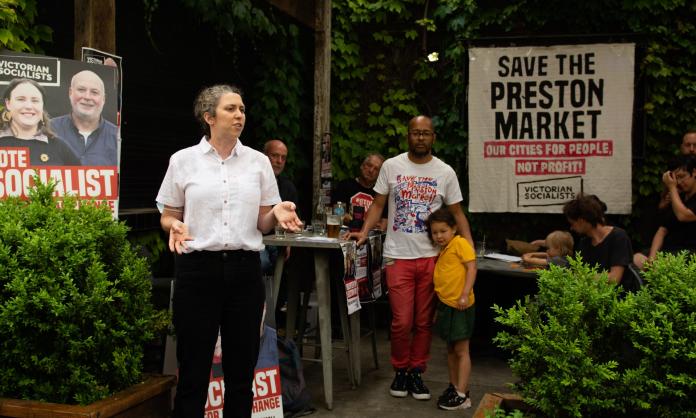Victorian Socialists—recognised by Beat magazine as “the most left-wing option Victorians have this election”, and by PEDESTRIAN.TV as “Fierce door knockers and grassroots campaigners”—is making a mammoth effort to push against the grain of history in the state election. The party has a chance of getting Jerome Small elected to the upper house in Northern Metro and Liz Walsh in Western Metro. If successful, it will be only the third time a socialist independent of the ALP has been elected to any Australian parliament.
The first was Percy Brookfield, a leading militant in the Broken Hill mines. Historian Humphrey McQueen described Brookfield as “possibly the most extreme anti-politician ever to be elected in this country” whose “probity withstood parliament”. In 1916, Brookfield led a successful fight for a 44-hour week for miners and played a prominent role in the anti-conscription campaign. His role in supposedly riotous actions, combined with the fact that he cursed the British Empire and called Labor leader Billy Hughes a “traitor, viper and skunk”, landed him in jail and incurred penalties worth the equivalent of about $75,000 today.
The right hated Brookfield because he supported the Russian revolution and defended the persecuted Industrial Workers of the World. He was Labor MP for Sturt in the NSW upper house from 1917, resigned from Labor in 1919, and was re-elected as a member of the Industrial Socialist Labor Party in 1920. Tragically, Brookfield was killed by a disturbed gunman in March 1921. A tall column in his memory, topped with a globe inscribed with “Workers of the world unite” dominates the entrance to the Broken Hill cemetery.
The second was Fred Paterson, who won the Queensland seat of Bowen for the Communist Party in 1944 and 1947. He used his position to organise support for striking railway workers in 1948. Labor Premier Ned Hanlon described a bill to outlaw picketing as the “Paterson Bill”, because it was designed to thwart tactics used by the Bowen MP.
The political situation today is very different from that of 1920 or 1944, when radical politics had much greater influence. Over the last two decades, the forces of the socialist left have contracted. Our unions, which have at times have led serious struggles, have retreated from class struggle militancy. Serious ongoing social movement mobilisations have also declined.
Yet economic and environmental crises continue to wrack society; now as much as ever we need a socialist movement prepared to defy authority, to hold onto its principles even when in a minority and to take the fight up to the hated billionaires and corporations. This begs the question: how can participating in parliament, dominated as it is by sterile debates mostly involving contemptible careerists, play a role in rebuilding the sort of movement we need?
First, simply campaigning to get principled, left-wing activists into parliament can draw people into activism and provide a sense of purpose that would otherwise be lacking. Already, there are many more people involved with Victorian Socialists than when it was set up four years ago. Hundreds of volunteers have knocked on more than 150,000 doors over the course of the campaign: a monumental achievement.
The hundreds of young people who imbue the campaign with enthusiasm and energy are gaining experience explaining why capitalism is to blame for the rising cost of living, wage stagnation and the lack of public transport, schools and hospitals. They are finding ways to use socialist theory to argue why standing against racism and gender oppression is necessary to build a united campaign against the material deprivations workers suffer. New and experienced activists are together visiting picket lines, like that of the Knauf workers in Port Melbourne.
Second, Victorian Socialists view electoral politics not as a means in itself, but as a way to strengthen struggles on the ground. The party has helped organise protest rallies for Tamil refugees, abortion rights, against climate change, and has attended rallies in solidarity with the mass uprising in Iran. It has thrown its weight behind community campaigns, like the one to save the Preston Market and to defend public housing.
This approach is reflected in the choice of candidates. The Victorian Socialists’ lead candidates, Liz and Jerome, both have long histories as grassroots activists, unionists and leaders. Liz participated in high school walk outs against Pauline Hanson in the late 1990s, and in the 25 years since has fought tirelessly for Indigenous, refugee and LGBTI rights. A highlight of Jerome’s four decades of activism was his contribution to the campaign that stopped the Jabiluka uranium mine on the land of the Mirrar people.
Liz and Jerome will not just represent workers and the oppressed; they will stand with them in protests, on pickets and by helping organise others in solidarity. They won’t just show up to give speeches at rallies; they will use parliament at every opportunity to advertise campaign activities. Theirs will be voices urging workers to stand together, explaining why each and every protest deserves and needs support.
Electoral work isn’t the only step on the road to rebuilding a socialist movement, and nor is it a short cut to that goal. But it can and has already played an important part in reinvigorating activism, expanding the horizons of political engagement and winning more people to the idea that capitalism needs to be challenged. For those who already see the need for radical change, it shows them that they are not alone—that there are others out there willing to take a stand.
We have a chance to go against the grain of politics-as-usual and make history on 26 November by putting a socialist into parliament. Be part of it.
What you can do:
Vote 1 Victorian Socialists in both houses. A critical mass of first preferences is vital if the Victorian Socialists are to have any chance of success.
Help campaign. Pre-poll voting stations are open from 14 November and election day is 26 November. Every volunteer makes a difference and helps get the message out.
Donate. The Victorian Socialists are not backed by corporations or the wealthy. They depend on donations from supporters. If you can donate, do so! Even small amounts matter.









